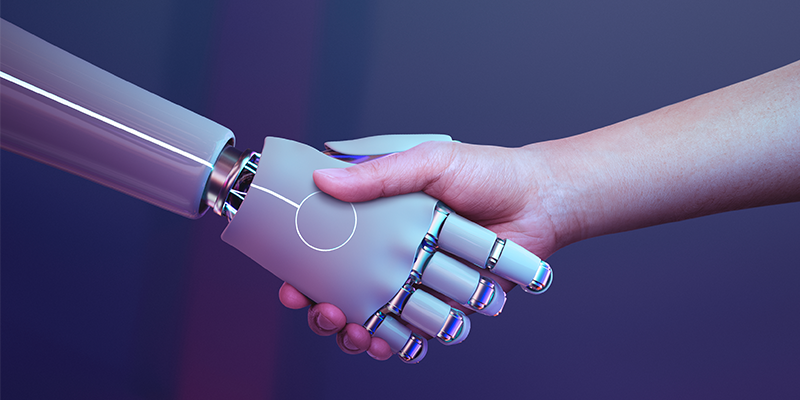Everyone’s talking about AI–and for good reason, especially in the healthcare marketing space. These sophisticated algorithms can help you analyze vast swaths of data, free you from many mundane tasks, and even offer 24/7 support for patients in the form of highly useful AI chatbots. Learn more about the human touch needed in healthcare marketing by reading on.
There are significant accomplishments. However, there are still some areas of the healthcare marketing ecosystem where it’s beneficial to maintain a human touch. These are areas where AI algorithms–no matter how advanced they may be–can’t offer the same level of service or interaction as a real living person could.
As AI becomes a larger and larger force within the marketing field, it will be especially important (for healthcare marketers, in particular) to know where AI excels and where a human touch is still preferred.
Healthcare Marketing Tasks That Still Require the Human Touch
AI is a powerful tool. But there will likely be some healthcare marketing tasks that will still require human intuition, intelligence, and creativity. That’s especially true in the following five areas–where AI may be able to help, but it will never be able to replace a human marketer.
1. Decision-Making
Healthcare is complicated. As a result, healthcare marketing is also complicated. Which means any decision a healthcare marketer must make will need to balance a wide variety of data inputs, ethical guidelines, and ROI indicators. Not every variable will be equally important, of course, and this means that humans are typically in the best position to make important healthcare marketing decisions.
AI can be useful to help you process vast amounts of data and provide interesting analyses. But an analysis is only a tool. Marketers are the ones who have to figure out how to use that tool.
This means that it’s up to professionals with expertise and experience to interpret all any amount of marketing data. The knowledge, empathy, and experience of these professionals is critical to success–and can’t be simply outsourced to AI.
There’s also something to be said for responsibility. AI does not have the ability to take responsibility for a marketing decision–and learn from it. But a human marketer does–which means people should be the ones calling the shots for your healthcare marketing campaign.
2. Ethical and Regulatory Oversight
AI can be programmed, but it doesn’t have knowledge. For healthcare organizations (and their marketers), ethical and regulatory issues can have enormous stakes. This means it can be difficult to trust your company’s compliance to an AI algorithm–no matter how sophisticated that algorithm might be. It simply can’t compete with the knowledge and experience of a person.
This means that healthcare marketing organizations should ensure that they are relying on professional, experienced marketers. Hire marketers who are familiar with HIPAA, the Americans with Disabilities Act, and all of the ethical and regulatory rules that healthcare organizations (and their marketing campaigns) may be expected to follow.
These are, after all, human-driven responsibilities–with real, lived consequences for patients. It’s up to humans, then, to ensure patient privacy, and that all regulations are followed in any healthcare marketing campaign.
3. Finding the Right Message
An AI algorithm can help you crunch numbers and discover new insights. But it takes a human to truly understand your audience. That’s because people have emotional and psychological nuances–especially when they’re looking for healthcare! As a result, it takes a marketing professional to find and craft an appealing and enticing message.
A healthcare marketer can empathize with a patient or put themselves in a patients’ shoes. AI might be able to help you generate messaging–but only a person can anticipate whether that messaging will be effective.
4. Building Trust and Relationships
Trust is absolutely critical to any healthcare relationship. Patients need to trust their doctors (and, by extension, the organizations to which the doctors belong). It’s true that AI can assist with patient engagement (especially after hours), but without a human-to-human connection, it’s impossible to build trust.
(After all, trust is something experienced between two people; you can rely on an algorithm, but you can’t trust one.) Without a foundation of trust, you can’t build a relationship with patients. This might be okay in some marketing niches, but in healthcare marketing, building that relationship with patients is absolutely essential. And to build that relationship, patients need to feel as though someone is listening to their needs. A marketing professional will know how to build and nurture these relationships over time–in a healthy way built on trust.
5. Cultural Sensitivity
AI is an algorithm–and no one has yet designed the algorithm that can fully understand and comprehend human cultures. Regional, social, and cultural differences impact healthcare on a daily basis. And the professionals working in the healthcare marketing field are well aware of these nuances (or can learn to become aware of them).
That’s because humans can understand context. An AI algorithm typically is not designed to do that. AI can help you successfully translate one language to the next, for example, but it won’t be able to help you decide on how to approach sensitive topics in your next healthcare marketing campaign. A healthcare marketer, however, can understand those necessary nuances and deliver a sensitive (and effective) campaign.
Let Humanity Take the Lead
Like anything else, AI can be a very useful tool in some areas–and less so in others. For healthcare marketers, then, it’s important to know where AI can be used and where it’s likely to let you down.
At PatientX, we prioritize patient experience–so we’re always asking whether an application of AI will be beneficial to patients. And where AI is not benefiting patients, it’s a good idea to let humanity take the lead.
Have questions about how to use AI in your marketing? Contact us today to schedule a conversation!

